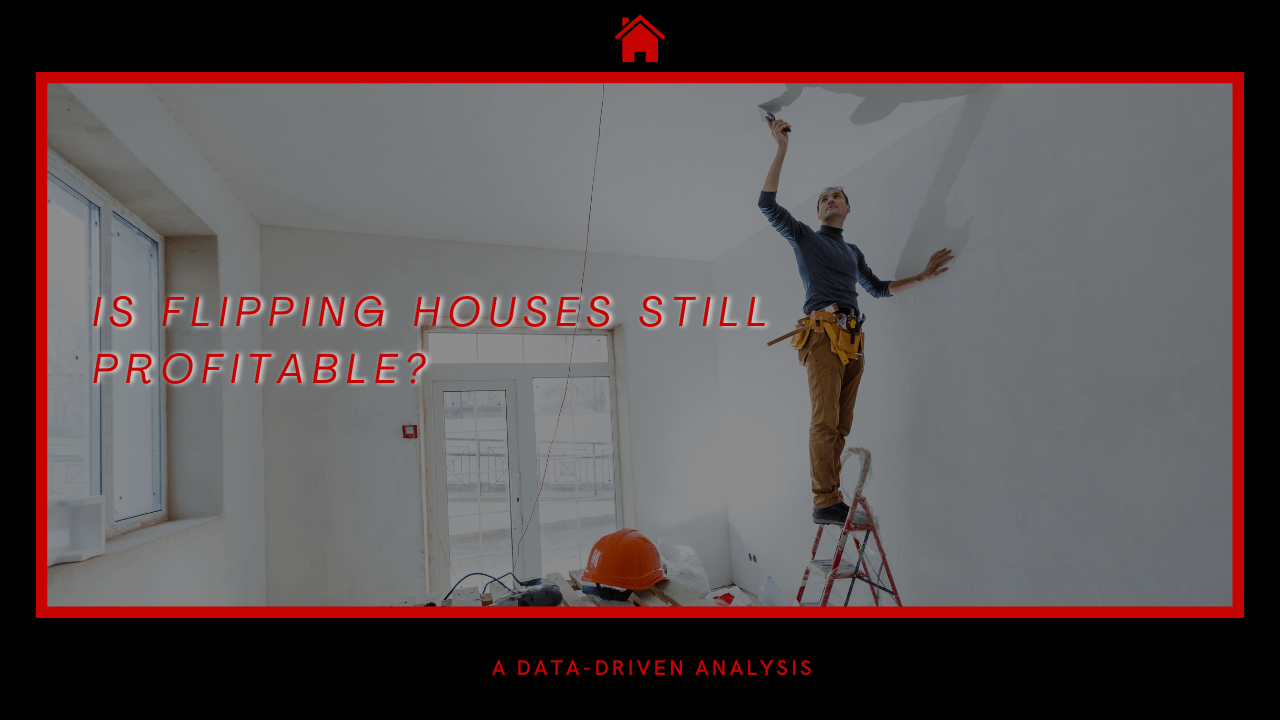In many real estate markets across the country, it’s become nearly impossible to make any money flipping homes. This once-popular form of real estate investment is more challenging when home prices are so high and inventory is so squeezed. We would not recommend you try it in some of the pricier markets.
In Hampton Roads, however, flipping houses is still incredibly profitable. In fact, the hot housing market and the high demand for housing contribute to a lot of good news for real estate investors who have flipping homes as part of their investment strategy.
Here’s our data-driven analysis of why it works in this market. We’re also sharing some tips on how to make it more profitable, and which mistakes you’ll want to avoid.
Flipping is Less Popular Now: The Data
For a long time, you couldn’t watch television without coming across a show that featured a glamorous house flipping project. It was really popular for a while.
Now, there’s less enthusiasm for flipping homes across the board, and some key data analytics tell us why. Keep in mind, this is data collected nationally. It’s not specific to Hampton Roads.
ATTOM released a 2023 U.S. Home Flipping Report earlier this year, showing that 308,922 single-family homes and condos in the United States were flipped in 2023.
That number was down 29.3 percent from 436,807 in 2022.
This is the largest annual drop since 2008.
Many of the sharpest decreases were in large metropolitan areas, with a population of 1 million people or more. Cities like Phoenix, Charlotte, Las Vegas, Sacramento, and Tucson all saw dramatic drops in the homes that were flipped.
That’s understandable. Homes in those markets are a lot more expensive, and it’s difficult to recoup the money that you might spend on a flip.
Smaller markets actually saw some increases, according to this report.
Cities like Macon, Georgia, Gulfport, Mississippi, and Dayton, Ohio showed an increase in home flipping rates.
Our local economy, real estate market, and pricing structure mirrors those smaller cities more so than the larger metropolitan areas.
How to Flip Homes Profitably in Hampton Roads
How can you make home flipping a profitable investment goal?
We have some ideas, and first we’ll share a little bit more data, since that’s what we’re using to talk about this topic today:
The National Association of Realtors released a report recently that said the best renovations for the highest values when you’re flipping a property include:
Bathroom remodels (71 percent ROI)
Kitchen remodels (75 percent ROI)
Flooring (147 percent ROI)
The lesson here is pretty clear for smart investors. You’ll want to rip out that carpet and invest in hardwood floors. Make sure the kitchens and the bathrooms are especially modern and new. Don’t waste time making improvements that won’t actually impact the value of the property you’re flipping.
There is always opportunity, especially if you’re a smart real estate investor who knows how to read the market. You have to be informed, and you have to be surrounded by experts.
Create a Renovation Budget and Stick to It
Your budget is the best way to estimate what you’ll earn. The trick is to stay on that budget.
Make sure that you’re looking at the big picture. Budget not only for the property purchase but also the repairs, materials, fees, and the unexpected costs that will undoubtedly show up once the work gets started. It’s not as easy as budgeting for a simple renovation project on a home you already own. You’ll have to determine what you’re going to spend to make the property profitable once you sell it.
Industry experts recommend that when flipping a house, you should budget based on the 70 percent rule.
If you’re not familiar with the 70 percent rule, it means that you should not pay more than 70 percent of the after-repair value, less any repairs that you’re flipping. Estimate how much you believe the property will sell for after you have made the renovations. Then, that amount by 70% and subtract it from the estimated cost of renovating the property. If the math doesn’t give you that percentage, you may not be choosing the right property to flip.
How Will You Buy the Property?
A lot of cash buyers are showing up in the market thanks to higher-than-normal interest rates which make borrowing money more expensive. If you’re sitting on some cash and you’d like to earn even more cash, this can be one way to do it. If you’d prefer to leverage other people’s money, however, you’ll want to finance your acquisition before you flip it.
Consider a hard money loan for flips. This is a short-term loan that has a higher interest rate but more flexible terms. Some investors find them risky, but you can make them work as long as you pay off the loan within a year or two. They’re ideal for flipping a house because you ideally won’t hold onto that long for any longer than the renovation takes.
Choose a Property that’s Profitable
While you might think that the most distressed home on the market will make you the most money, this is not always the case. Flipping the wrong property will result in a big expense and a lot of frustration. Choose a property with potential. It’s best to buy something that’s generally well-maintained but perhaps outdated and mostly in need of aesthetic improvements. This gives you the opportunity to make mostly cosmetic upgrades rather than major rehab work.
Budget Your Time as Well as Your Funds
Certainly the monetary budget is critical, but it’s also important to budget your time and other resources. Coordinate with contractors and service providers so you know when you can expect to book them. Make sure you’re scheduling those plumbers, electricians, roofers, and other experts ahead of time. You want to have everyone in place as soon as you close so there’s no time wasted on the renovation part of this process.
It’s important that you’re working with the right timeline, the right budget, and the right property. Your contractors matter, too. Make sure you’ve identified reliable, responsible professionals who will help you move this project along.
How to Avoid Expensive Mistakes when Flipping Hampton Roads Properties
They make it look pretty easy on HGTV.
However, there are likely mistakes waiting to be made. Here’s what they are and how to avoid them.
First, plan for surprises. You cannot possibly prepare for every eventuality. A property might look easy enough to restore and renovate, and then you’ll knock down a wall and find black mold. Or bees. Or who knows what else. These are almost always problems that can be solved. Just realize that you cannot plan for everything. Build in the time that’s necessary to solve these problems.
Don’t make the mistake of hiring some guy off the street to do your drywall. Working with cheap labor or uninsured workers is just asking for trouble. You could even end up spending more because cheap labor often takes longer. Their work isn’t always the best, either, and that’s going to show in the finished product, which means you won’t earn what you’re hoping to earn.
Finally, don’t expect a quick sale. That’s ideally what will happen, but it’s not something you should assume. Depending on the market, it could be a while before you’re able to sell for the price you want.
Data on the Future of Flipping
Hampton Roads enjoys a diversified economy, with key sectors including military, tourism, and healthcare. According to recent reports, the region's economy is expected to grow steadily over the next few years. This economic stability translates into a robust real estate market, making it an attractive option for investors and another great market where it’s possible to make money flipping homes.
Here are some key data points for real estate investors to consider as you think about flipping homes in the future:
Average Time on Market
One of the most crucial metrics for home flippers is the average time a property spends on the market. In Hampton Roads, properties are selling relatively quickly, with an average time on market of around 30 days. This quick turnover rate is advantageous for flippers, as it minimizes holding costs and accelerates returns on investment.
Renovation Costs
Understanding renovation costs is essential for calculating potential profit margins. Data from HomeAdvisor indicates that the average cost of a home renovation in Hampton Roads ranges from $20,000 to $60,000, depending on the scope of the project. Real estate investors should factor these costs into their financial projections to ensure a profitable flip.
Demographic Shifts
The demographic landscape of Hampton Roads is evolving. The region is attracting a younger, more diverse population drawn to its job opportunities and quality of life. This influx of new residents is likely to sustain demand for housing, providing a steady stream of potential buyers for flipped homes.
Environmental Considerations
Sustainability is becoming increasingly important to homebuyers. Properties that feature eco-friendly upgrades such as energy-efficient appliances and solar panels are more attractive to the modern buyer. Investors who incorporate these elements into their renovations may find their properties selling faster and at higher prices.
 Let’s talk about your strategy for flipping houses. Contact us at Doud Realty Services, Inc. We provide expert property management in Norfolk, Portsmouth, Hampton Roads, as well as surrounding areas such as Virginia Beach, Suffolk, Chesapeake, and Newport News.
Let’s talk about your strategy for flipping houses. Contact us at Doud Realty Services, Inc. We provide expert property management in Norfolk, Portsmouth, Hampton Roads, as well as surrounding areas such as Virginia Beach, Suffolk, Chesapeake, and Newport News.


